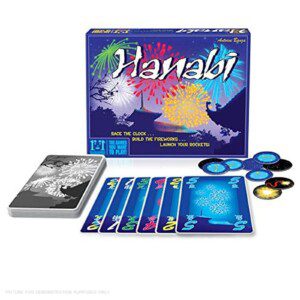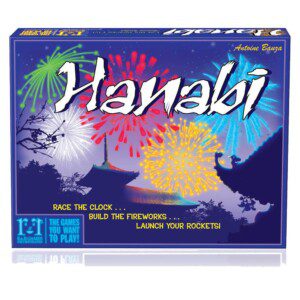 If you’ve never played a co-operative game, I always insist that Hanabi (the Japanese word for fireworks) is a fantastic place to start, and not only because it’s cheap. This simple but clever little card game rides on one primary rule: your cards face your teammates. This means nobody can see his or her own cards, but they do have a clear visual of everyone else’s. You and your teammates are relying on each other to give clues, either the colour or number, of what your cards are with the ultimate goal of placing down as many cards as you can in colour and number order (1-5). This requires a bit of memory, and certainly some deduction.
If you’ve never played a co-operative game, I always insist that Hanabi (the Japanese word for fireworks) is a fantastic place to start, and not only because it’s cheap. This simple but clever little card game rides on one primary rule: your cards face your teammates. This means nobody can see his or her own cards, but they do have a clear visual of everyone else’s. You and your teammates are relying on each other to give clues, either the colour or number, of what your cards are with the ultimate goal of placing down as many cards as you can in colour and number order (1-5). This requires a bit of memory, and certainly some deduction.
There’s such fantastic tension when you move to play a card that you only been told is a 4, and seeing that the white cards are up to number 3, you gamble that you were given this clue in the hope that you would play it. But you might be wrong, and, oh drat, was it this card that was the 4? But you play it anyway, and everyone breathes a sigh of relief when you reveal the white 4! There’s a balancing act, since clues are actually a precious commodity that you must maintain. On your turn you can either use a clue token, discard a card to gain a clue token, or play a card (which, if it isn’t legal, will cost you a fuse token, bringing you a step closer to losing) – and you must always keep a straight face, no subtle shake of the head when you experience the horror of watching someone go to discard an important card that nobody has had the opportunity to give the player a clue for! It’s the kind of game that you will get better and better at the more that you play, each of you growing and learning what certain clues at certain times might mean, and what to prioritise.
I do have to take a moment to talk about the deluxe edition, With heavy mah-jong style tiles instead of cards, this is a game that I will cherish always not only for its enticing gameplay, but also for its lovely tactile feel (reminding me of an equally exceptional game: Hive). The tiles are wonderfully practical, lending you the space to stand them in front of you rather than constantly holding them, and to lay them longways to aid with your own memory techniques. I personally can’t play any other way now; I adore the heft of the tiles too much to go back to cards. However, while I mentioned that this tiny, tasty little card game is a cheap one, the price for the deluxe edition FLIES up, so do be aware that this is absolutely a luxury and not at all a necessity. Regardless of the edition, Hanabi plays brilliantly for 2-5 players in as little 20-30 minutes.
Any chance I can, I’m always recommending folks co-operative games, and for the hesitant ones that insist their families, friends or partners love to compete, I always urge them to give Hanabi a go. The joint effort on everyone’s part makes for such good fun, and if you lose, everyone loses, so no one will be upset. You will share your highs, praising each other for a good play, and everyone is equal, relying on each other for information and trusting each other to do their best with what they’re given. While you might be frustrated when someone forgets what you told them not 2 minutes ago, the same will almost definitely happen to you later, and this is a great leveller for everyone to remember that you are a team, and also, ultimately, human.





